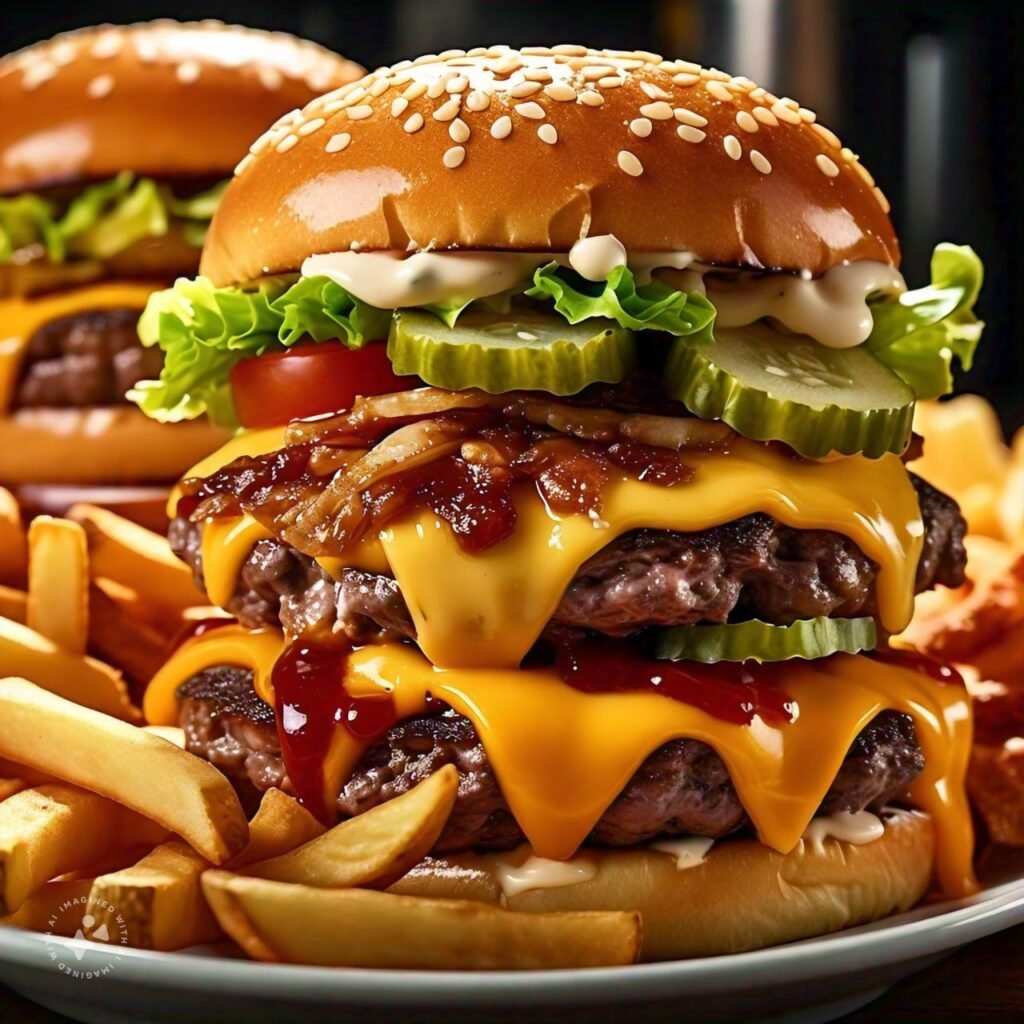Table of Contents
Introduction:
Junk food refers to foods that are high in calories, added sugars, salt, and unhealthy fats, but low in essential nutrients like vitamins, minerals, and fiber. These foods are often highly processed, packaged, and easily accessible, making them convenient but unhealthy choices.

Examples of junk foods include:
Examples of junk foods include:
- Fried foods like fries, burgers, and fried chicken
- Processed meats like hot dogs, sausages, and bacon
- Sugary snacks like chips, crackers, and cookies
- Candy and baked goods
- Frozen meals and TV dinners
- Soda and sports drinks
Junk foods are often characterized by their:
- High calorie density
- Low nutrient content
- High levels of added sugars, salt, and unhealthy fats
- Presence of artificial ingredients and preservatives
- Convenience and portability.
Famous name of Junk Food:
- Burgers ,pizza (especially fast food)
- Tacos (especially from fast food chains)
- Fried chicken wings
- Onion rings
- Processed cheese products (e.g., Cheetos, Cheez-Its)
- Energy bars (many are highly processed)
- Fruit snacks (often high in added sugars)
- Canned goods
- Boxed meals (e.g., mac and cheese, Hamburger Helper)
- Donuts
- Pastries (e.g., Danish, croissants)
- Sugary yogurts
- Breakfast cereals (many are high in added sugars)
- Ice cream Junk foods are characterized by:
Junk Foods are characterized by:
- High levels of added sugars
- High levels of unhealthy fats (e.g., trans fats, saturated fats)
- High sodium content
- Low fiber content
- High calorie density
- Presence of artificial additives (e.g., preservatives, flavor enhancers) The impact of junk food on individuals and populations:
The Impact of Junk Food on Individuals and Populations:
- Childhood obesity in the UK: 26.4% of children aged 2-15 are obese or overweight due to high junk food consumption.
- Diabetes in India: 8.8% of adults (over 72 million people) have diabetes, partly due to increased junk food consumption.
- Heart disease in China: 25% of deaths (over 2.5 million annually) are attributed to heart disease, linked to high junk food intake.
- Malnutrition in Africa: 22% of children under 5 years old suffer from malnutrition, partly due to reliance on junk food.
- Dental problems in Brazil: 75% of children aged 12-15 have tooth decay, linked to high sugar consumption from junk food.
- Cancer cases in Europe: 10% of cancer cases (over 500,000 annually) are attributed to poor diet, including high junk food consumption.
- Mental health concerns in the US: 20% of adults (over 47 million people) experience depression, linked to junk food consumption.
- Obesity in Saudi Arabia: 35.4% of adults are obese, largely due to high junk food intake.
- Type 2 diabetes in Canada: 8.1% of adults (over 2.5 million people) have type 2 diabetes, partly due to junk food consumption.
- Heart disease in Russia: 55% of deaths (over 1.5 million annually) are attributed to heart disease, linked to high junk food intake.
Should we eat fast food everyday?
No, it’s not recommended to eat fast food every day. Fast food is high in:
- Calories
- Added sugars
- Saturated and trans fats
- Sodium
- Processed ingredients
- Low in essential nutrients like:
- Fiber
- Vitamins
- Minerals
- Antioxidants
Regularly consuming fast food can lead to:
- Weight gain and obesity
- Increased risk of heart disease and stroke
- Higher risk of type 2 diabetes
- Nutrient deficiencies
- Digestive problems
- Energy crashes and mood swings
- Negative impact on gut health
Instead, aim to limit fast food consumption to:
- Occasional treats (1-2 times a week)
- Special events or emergencies
- Balance fast food with nutrient-dense meals and snacks
Prioritize whole, minimally processed foods like:
- Vegetables
- Fruits
- Whole grains
- Lean proteins
- Healthy fats
Remember, a balanced diet and healthy habits support overall well-being and long-term health.
Here are some additional reasons why eating fast food every day is not recommended.
- Link to certain cancers:
Regular fast food consumption has been linked to an increased risk of certain cancers, including colorectal, breast, and prostate cancer. - Negative impact on mental health:
A diet high in fast food has been linked to depression, anxiety, and other mental health concerns. - Lack of essential nutrients:
Fast food often lacks essential vitamins, minerals, and antioxidants, leading to nutrient deficiencies over time. - Impact on gut health: Regular fast food consumption can disrupt the balance of gut bacteria, leading to digestive issues and other problems.
- Contribution to antibiotic resistance:
Fast food often contains meat from animals raised with antibiotics, contributing to antibiotic resistance. - Environmental impact: The production, packaging, and distribution of fast food contribute to greenhouse gas emissions, pollution, and waste.
- Dental problems:
The high sugar content in fast food contributes to tooth decay, cavities, and other dental issues. - Nutrient imbalances:
Regular fast food consumption can lead to an imbalanced diet, causing nutrient deficiencies and health problems.
Here are some additional reasons why eating fast food every day is not recommended: - Slows down metabolism: Regular fast food consumption can slow down your metabolism, making it harder to lose weight and maintain weight loss.
- Affects bone health: A diet high in fast food has been linked to an increased risk of osteoporosis and bone fractures.
- Increases risk of kidney disease: Regular fast food consumption has been linked to an increased risk of kidney disease and kidney stones.
- Negatively impacts eye health: A diet high in fast food has been linked to an increased risk of age-related macular degeneration and cataracts.
- Affects immune system: Regular fast food consumption can weaken your immune system, making you more susceptible to illnesses.
- Increases risk of allergies: A diet high in fast food has been linked to an increased risk of food allergies and intolerances.
- Negatively impacts skin health: Regular fast food consumption can lead to acne, premature aging, and other skin problems.
Some Basic Definitions of Junk Food:
- Fried Foods :
- French fries
- Fried chicken
- Doughnuts
- Fried snacks (e.g., chips, crackers)
- Processed Meats:
- Hot dogs
- Sausages
- Bacon
- Canned meat (e.g., Spam)
- Sugary Treats:
- Candy
- Cakes
- Pastries
- Cookies
- Refined Grains:
- White bread
- Sugary cereals
- Processed snacks (e.g., chips, crackers)
- Refined pasta
- High-Sugar Drinks:
- Soda
- Sports drinks
- Energy drinks
- Sweetened tea/coffee
- High-Fat Snacks:
- Chips
- Popcorn (microwave)
- Fried snacks (e.g., cheese puffs)
- Creamy dips (e.g., sour cream, guacamole)
- Fast Food:
- Burgers
- Pizza
- Fried chicken sandwiches
- Tacos (from fast-food chains)
- Baked Goods:
- Muffins
- Croissants
- Danishes
- Cinnamon rolls
Conclusions :
- Junk food is a treat, not a staple:
Enjoy junk food in moderation, but prioritize whole, nutrient-dense foods for regular consumption. - Health risks are real:
Regular junk food consumption is linked to various health problems, including obesity, diabetes, heart disease, and certain cancers. - Nutrient imbalance:
Junk food often lacks essential nutrients and is high in empty calories, leading to nutrient deficiencies and imbalances. - Addiction is possible:
Junk food can be addictive due to high sugar and salt content, leading to overconsumption and negative health effects. - Environmental impact:
Junk food packaging contributes to waste and pollution, highlighting the need for sustainable choices. - Healthier alternatives exist:
Choose baked or air-popped snacks, and opt for healthier ingredients and cooking methods. - Education and awareness:
Understanding the effects of junk food can empower individuals to make informed choices and develop healthier habits. - Balance is key:
Allow for occasional indulgence, but maintain a balanced diet with whole foods to support overall health and well-being. - Industry responsibility:
Manufacturers can reformulate products to be healthier, and governments can implement regulations to promote healthier choices. - Personal responsibility:
Individuals have the power to choose what they eat and can make informed decisions to prioritize their health and well-being.
